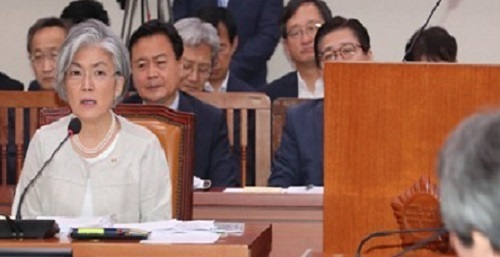Talks are underway between South Korea and the United States on possibly using a "secondary boycott" aimed at toughening sanctions against North Korea's evolving missile and nuclear programs, Seoul's top diplomat said Monday.
Foreign Minister Kang Kyung-wha made the remarks during a parliamentary committee session in response to a question about what measures are being considered in the wake of the North's recent missile provocation.
 |
(Yonhap) |
"Talks are underway even on the option of (using) a secondary boycott," she said.
A secondary boycott is intended to penalize third-country firms for doing business with the North. It has been cited as one of the most effective ways to force China to join global efforts to pressure the North given their close ties both in diplomatic and business areas.
Her remarks came days after the North claimed on Tuesday that it successfully test-fired an intercontinental ballistic missile capable of hitting the United States.
The latest provocation drew strong condemnation from the world and sending the international community scrambling to take tough countermeasures against its regime.
The efforts to punish the North through the United Nations Security Council, however, appear to be facing a bumpy road as China and Russia apparently do not want to go as tough as the US and other countries. Observers say that it could take a long time before producing a consensus.
"The US seems to be trying to maximize its economic sanctions (against the North) either through the United Nations Security Council or on its own," Kang said. "If the outcome of the UNSC negotiations is not satisfactory, I think that the US could explore its own unilateral sanctions."
Kang assured lawmakers that the US surely will work with South Korea should it decide to seek to impose its own sanctions against the North.
She also expressed willingness to consider pursuing ministerial talks with North Korean Foreign Minister Ri Yong-ho at the Associaton of Southeast Asian Nations Regional Forum in the Philippines slated for early next month. The ASEAN regional forum is almost the only multilateral summit that Pyongyang takes part.
With regard to the apparent differences among the US, China, Russia and Japan on how to respond to the North's continued provocations, Kang noted that the four global powers along with South Korea have the same objective of "completely" dismantling its nuclear program.
"I think that there might be a little bit of differences in terms of methods of how to reach the objective," she said. "It's too much to say that they (the differences) are pointing to the emergence of the new Cold War." (Yonhap)








![[Today’s K-pop] Blackpink’s Jennie, Lisa invited to Coachella as solo acts](http://res.heraldm.com/phpwas/restmb_idxmake.php?idx=644&simg=/content/image/2024/11/21/20241121050099_0.jpg)